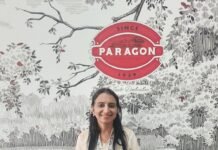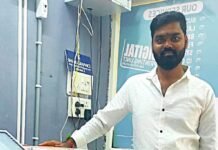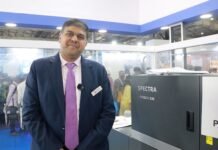
Noida-based Objectify Technologies, one of India’s leading 3D printing companies, was started in 2013 by two brothers, Ankit Sahu and Arpit Sahu. Emanating from the IIT Council’s Innovation Information Center, the brothers have been working with sectors like aerospace, automotive, oil, gas, and healthcare to develop new products.
Engaged in technology development projects for customers in these segments, the company manufactures components ranging from engine parts for the space and aerospace program and retrofit components for the oil and gas and power generation companies using additive manufacturing.
Objectify Technologies claims to be one of the largest companies in India providing additive manufacturing services and has a complete setup of polymers and metals. All of its machines, used for Direct Metal Laser Sintering, Selective Laser Sintering, and others, are imported from the US or Germany. It executes much of the design and development for its clients, including simulation consultancy and component-level development. All in all, it offers a set of engineering and production services.

Photo: Objectify Technologies
Ankit Sahu, CEO and one of the founders, says, “After the Russia-Ukraine war, many Indian defense organizations were relying on Russian components, which had a different level of metallurgy. Thus, for India to maintain the supply chain, we are currently developing international quality alloys for the Indian space or missile program, and this is a new dimension in our current offerings. Our major customers are ISRO, DRDO, Boeing, and various other companies in the aerospace and automotive segments. We have two offices, our polymer facility in New Delhi, and the other in Noida, our metal facility.”
According to Sahu, all the BS6 engines of the Indian automotive industry that came out in 2020 were developed by Objectify Technologies. “We are also working on helicopter engines such as turbofan and turbo craft engines and a few missile programs, the company supports all those kinds of activities,” he says.
It is also working on several oil and gas projects and other projects with a few known companies. The company is comprehensively familiar with industrial 3D additive printing and manufactures some of the valves and pumps functioning in Siberia and in the Middle East.

Photo: IPP
Commenting on 3D-additive component production in India, Sahu explains, “The future of industrial printing is that there is a phase when the industry goes through a transition. Currently, we are in a transition phase on the manufacturing side of this. The buzzword is industry 4.0, and we are focusing on digital inventories. Right now, our major focus is to have everything digitized, so we are minimizing our inventory cost or the share of the cost for our customers. We redesign the component and try to reduce a bit of the material to design a component in additive manufacturing technology.”

“The Covid period for us was a bit challenging but too bad as we started in April 2020. Both offices were open, and we had projects from the medical ventilator side as we were manufacturing the pumps and valves for ventilators at our metal facility. And at our polymer facility, we were manufacturing the tubing and the housing of the ventilators. We also helped with some mask-related activities and made many face shields. As we restarted our business and grew during Covid-19 because the type of sectors we served came under essential services, we were not directly affected by the lockdowns. But our customers were affected, and they faced the challenges of not receiving components on time as the supply chain was difficult.”
“Now, we are working on expanding new technologies in 3D printing and are focusing on expanding our reach in North America and the Israel market. Currently, we are doing several projects based out of these regions. And we have a vision of Make in India – that we are at least starting something for our Indian customers, while many Indian business people don’t believe in Make in India. In this way, too, we hope to differentiate ourselves from others.”
















